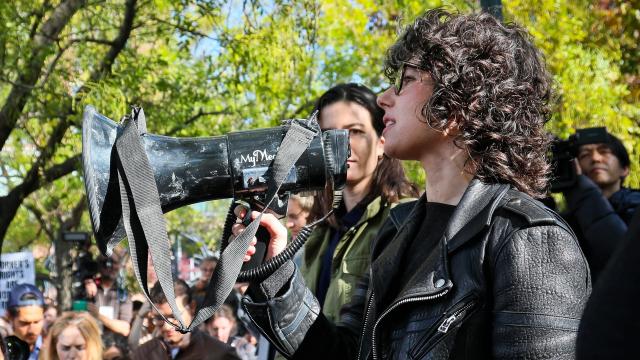Since its debut eight years ago, the face of the encrypted messaging app Signal has been its founder Moxie Marlinspike. In January, Marlinspike said he’d be stepping down as CEO. And while Signal hasn’t found a permanent replacement for its top executive, it’s starting to round out its leadership bench. On Monday, the company announced that Meredith Whittaker, a respected critic of big tech, would take on the newly created role of president.
In a blog post, Whittaker said that her focus will be on “guiding Signal’s strategy, ensuring our financial sustainability, sharpening and broadening Signal’s public communications, and whatever else is needed to strengthen the app and the org.” Speaking with the Washington Post on Tuesday, Whittaker made it clear that a big part of that mission will be convincing people to cough up some cash for the privilege of using what is widely regarded as the most secure commercially available messaging app.
“It costs tens of millions of dollars per year to develop and maintain an app like Signal,” she told the Post. In recent years, Signal has been able to avoid commercial pressures thanks to a $US50 ($69) million interest-free loan from Brian Acton, a co-founder of WhatsApp and current interim CEO of Signal. And there’s no indication that Signal is in trouble financially, but Whittaker laid out the broad strokes of why she believes it’s important that the non-profit build a war chest for growth.
“The more people who use Signal, the more people we can talk to on Signal, that’s more people whose communication is private and encrypted,” Whittaker said, which should be somewhat obvious. Its major competitors simply don’t offer the purity of privacy protections that Signal does — Telegram uses cloud backups and WhatsApp shares metadata with its parent company Meta. The importance of end-to-end encryption became all too real when it was revealed in August that Facebook had provided communications to law enforcement relating to a case of a woman in Nebraska who is being prosecuted for an alleged illegal abortion. Since then, Facebook has begun to test end-to-end encryption on Messenger but why even deal with that when Signal is right there not hurting anyone?
But the argument that Signal is safe hasn’t managed to make it a must have on every smartphone. According to WaPo, it’s been downloaded around 150 million times. That’s nothing to sneeze at but is dwarfed by WhatsApp’s 2 billion downloads and counting.
Whittaker is making the case that using Signal is also a way to slow down the progress of the potentially dangerous AI products being developed by reckless tech companies like Meta and Google. The bottom line is that most social media companies are using the data they collect on platform to train artificial intelligence products. Signal doesn’t do that.
Whittaker has been a long-term critic of AI development, and in 2017 she co-founded the AI Now Institute at NYU which is dedicated to studying the social ramifications of AI in the near-term. She is also known for her work at Google where she was employed for 13 years and became a vocal critic of that company’s “Project Maven” — a deal with the Pentagon to develop drone tech. She also helped organise worker protests of Google’s handling of sexual harassment claims. Whittaker resigned from Google in 2019 and said she’d faced retaliation for her activism while working at the search giant.
Since 2020, she’s been a member of Signal’s board of directors and will now be taking on the full-time role as its president. For now, her priority appears to be convincing the public to make donations to the Signal Foundation and increasing public transparency on how the money is spent. Much like Wikipedia, Signal makes it easy to donate in its app or set up recurring monthly donations.
There’s no reason to believe that Signal is going to move to being a paid service, but I don’t think that would be the worst thing in the world. We all have subscription overload but it might be worth cancelling your Peacock account to support an ad-free, privacy-focused social media service. Zuckerberg has floated the idea of offering a paid version of Facebook without the ads in the past, but no promises of limiting data collection. Snapchat and Twitter have already begun rolling out some paid features with limited success. When Twitter announced that it would begin testing an edit button for Twitter Blue subscribers last week, many users joked that an edited tweet was an embarrassing admission that a person actually pays for Twitter Blue.
I can’t recommend Twitter Blue, but I do think it’s time we start getting comfortable with paying for social media if a company is genuinely trying to improve this great societal mess we’ve gotten ourselves into. So throw a few dollars Signal’s way — or don’t. The most important thing is use Signal.
